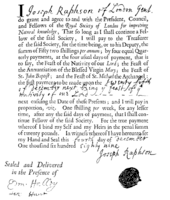Joseph Raphson
Joseph Raphson (c. 1648 – c. 1715) was an English mathematician known best for the Newton–Raphson method.
Joseph Raphson | |
|---|---|
| Born | c. 1648 |
| Died | c. 1715 |
| Nationality | English |
| Alma mater | University of Cambridge |
| Known for | Newton–Raphson method |
| Scientific career | |
| Fields | Mathematician |
| Signature | |

Biography
Little is known about Raphson's life, and even his exact years of birth and death are unknown, although the mathematical historian Florian Cajori provided the approximate dates 1648–1715. He was likely of Jewish and Irish descent.[1] Raphson attended Jesus College at Cambridge, graduating with an M.A. in 1692.[2] He was made a Fellow of the Royal Society on 30 November 1689, after being proposed for membership by Edmund Halley.
Raphson's most notable work is Analysis Aequationum Universalis, which was published in 1690. It contains a method, now known as the Newton–Raphson method, for approximating the roots of an equation. Isaac Newton had developed a very similar formula in his Method of Fluxions, written in 1671, but this work would not be published until 1736, nearly 50 years after Raphson's Analysis. However, Raphson's version of the method is simpler than Newton's, and is therefore generally considered superior. For this reason, it is Raphson's version of the method, rather than Newton's, that is to be found in textbooks today.
Raphson was a staunch supporter of Newton's claim, and not that of Gottfried Leibniz, to be the sole inventor of calculus. In addition, Raphson translated Newton's Arithmetica Universalis into English.
Raphson coined the word pantheism, in his work De Spatio Reali, published in 1697,[3] where it may have been found by John Toland, who called Raphson's work "ingenious".[4] In De Spatio Reali, Raphson begins by making a distinction between atheistic panhylists (from the Greek pan 'all' and hyle 'wood, matter'), who believe everything derives from matter, and pantheists who believe in “a certain universal substance, material as well as intelligent, that fashions all things that exist out of its own essence”.[5] Raphson further believed the universe to be immeasurable in respect to a human's capacity of understanding, and that humans will never be able to comprehend it.[6]
Notes
- Thomas, David J. (1885–1900). . Dictionary of National Biography. London: Smith, Elder & Co.
- "Ralphson, Joseph (RLF692J)". A Cambridge Alumni Database. University of Cambridge.
- Thomson, Ann (2008). Bodies of Thought: Science, Religion, and the Soul in the Early Enlightenment. New York: Oxford University Press. p. 54. ISBN 978-0-19-923619-0.
- De Spatio Reali
- De Spatio Reali, page 2
- The Closed World to the Infinite Universe by Alexandre Koyre
References
- Thomas, David J.; Smith, Judith M. (1990). "Joseph Raphson, F.R.S.". Notes and Records of the Royal Society of London. 44 (2): 151–167. doi:10.1098/rsnr.1990.0016.
External links
| Wikimedia Commons has media related to Joseph Raphson (mathematician). |
- O'Connor, John J.; Robertson, Edmund F., "Joseph Raphson", MacTutor History of Mathematics archive, University of St Andrews.